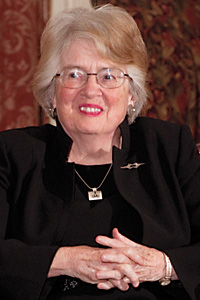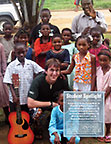Lauding an Illustrious Career from the Factory to the Bench
Annual Survey is dedicated to the Honorable Patricia Wald.
Printer Friendly VersionIn the summer of 1948, before entering Yale Law School with the intent of becoming a labor attorney, Patricia McGowan hit the bricks with her uncle and grandfather—in picket-line solidarity with a United Auto Workers strike—at a ball bearing factory in gritty Torrington, Connecticut, where she worked as a “greaser.”
This was before McGowan earned her J.D., married lawyer Robert Wald, and, much to the consternation of religious conservatives in Congress who labeled her an “instrument of the Devil,” became the Honorable Patricia M. Wald—and now former chief judge of the U.S. Court of Appeals for the District of Columbia Circuit; former associate judge for the International Criminal Tribunal for the Former Yugoslavia; mother of five, grandmother of 10; and, in frigid Iowa during the presidential caucus season, a heavily bundled, 79-year-old canvasser schlepping door-to-door in the cause of Barack Obama.
 For her numerous accomplishments, as well as persistent good humor, student editors dedicated the 2009 Annual Survey of American Law to Judge Wald. She was lauded by fellow D.C. Circuit judge Harry T. Edwards, professors and former clerks Cynthia Estlund and Nancy Morawetz ’81, and former colleagues Kelly Askin, senior legal officer at the Open Society Justice Initiative, and David Tolbert, senior fellow at the Jennings Randolph Fellowship Program of the United States Institute of Peace. All spoke of light-hearted and even comic moments that leavened what they called an “inspired and inspiring” career.
For her numerous accomplishments, as well as persistent good humor, student editors dedicated the 2009 Annual Survey of American Law to Judge Wald. She was lauded by fellow D.C. Circuit judge Harry T. Edwards, professors and former clerks Cynthia Estlund and Nancy Morawetz ’81, and former colleagues Kelly Askin, senior legal officer at the Open Society Justice Initiative, and David Tolbert, senior fellow at the Jennings Randolph Fellowship Program of the United States Institute of Peace. All spoke of light-hearted and even comic moments that leavened what they called an “inspired and inspiring” career.
Judge Edwards recollected circuit bench conferences when “you always want to hear what Judge Wald has to say because she clears your head and improves your understanding, and maybe she’ll be funny as well.” Estlund, Catherine A. Rein Professor of Law, praised Wald for her “refusal to lose sight of the concerns of ordinary people” who are affected by broad theories of law settled in appellate decisions. And Morawetz, professor of clinical law, cited her mentor as a “role model for women clerks,” on and off the judicial clock.
“One night, we all went to a bar and taught her to play Pac-Man,” Morawetz disclosed. “The judge went incognito—as ‘Marge.’”
In an interview prior to the ceremony, Wald remembered that summer of ’48, and the woman she holds responsible for her success—her mother, Margaret O’Keefe McGowan, who, when her husband disappeared during the Great Depression, raised their child alone, determined that a girl could go far from the mill town of her birth.
Indeed, following a postgraduation clerkship in New York, she wound up in Washington, D.C., due to her husband’s U.S. Navy assignment. The federal government was “in the throes of loyalty hearings” that year, Wald explained. Accordingly, she dropped labor law to sign on at a firm that defended victims of Senator Joseph McCarthy, the notorious red-baiter and blacklist bully. The firm was, she said, “a more appropriate place to work” in 1952.
She left practice to raise her children. When, in the 1960s, Wald returned to law as a female lawyer 10 years out of the game, the available opportunities led her into part-time criminal justice work, which included children’s rights—a pursuit that later prompted opposition from religious zealots during congressional hearings on her appointment to the D.C. Circuit by President Jimmy Carter. “The stance of some evangelical and conservative groups was that families should make all important decisions about the child,” Wald explained, adding that lawyers like her, bent on children’s health and drug education, “constituted an unjustified intrusion into the sanctity of family life.”
To be accused of complicity with Lucifer in congressional hearings, said Wald during her short thank-you address, was “particularly galling since my five kids had to sit stoically through the entire harangue.”
Afterward, however, a reporter asked one of her sons for his reaction. The son made his mother proud by saying, “Well, she burns the lamb chops, but otherwise she’s O.K.”
–
All of 2009 Student Spotlight

 Multimedia
Multimedia